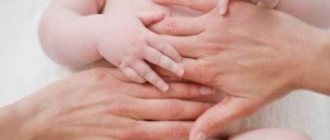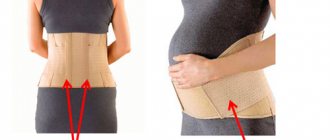Daria Aleksandrovna Khlipunova, an obstetrician and gynecologist at the Babyboom Expert Center for Pregnancy Planning and Management, shares.
When to see a doctor
You should consult a doctor if the following complaints occur:
- Vomiting more than 5 times a day, - Loss of body weight more than 3 kg in 1-1.5 weeks, - Increased blood pressure more than 120/80 mm Hg. Art., - Problems with vision, such as blurring or blinking before the eyes, - Severe headache, - Pain in the lower abdomen of any nature (aching, cramping, stabbing, etc.), - Epigastric pain (in the stomach area), - Swelling of the face , arms or legs, - The appearance of bloody or copious liquid discharge from the genital tract, - Fever more than 37.5, - Absence or change in fetal movements for more than 12 hours (after 20 weeks).
Physiological reasons
Starting from the thirty-seventh week of pregnancy, expectant mothers experience a number of changes in their bodies. The main thing is to move the uterus to the pelvic region. It stops squeezing the lungs, but begins to interfere with the intestines, causing frequent contractions and, accordingly, diarrhea.
During this period, the female body gradually prepares for childbirth. Therefore, loose stools at 37 weeks often indicate prenatal cleansing.
Diarrhea also occurs due to changes in hormonal levels. From the 37th week, the female body actively produces progesterone, a substance responsible for the safety of the fetus. This hormone has a strong effect on the intestinal tract, knocking it out of its normal rhythm.
What is the danger?
Not all women know how long it will take to give birth after the first signs of labor appear. Diarrhea is a sign of imminent labor only if abdominal prolapse has already occurred, there were symptoms of false contractions, and there are no other dyspeptic symptoms. In other cases, at 37 weeks of pregnancy, diarrhea may be an alarming symptom.
When diarrhea is caused by an infectious disease, there is always a risk of infecting the unborn child. Sometimes he can “catch” the infection directly during childbirth while passing through the birth canal. Sometimes infection occurs through the placenta.
Severe dehydration that accompanies diarrhea is life-threatening for the unborn child. This can lead to fetal hypoxia.
It is important to remember that diarrhea in earlier stages may indicate the development of the labor process. This leads to premature birth or miscarriage. Frequent intestinal spasms affect the activity of the uterus, which stimulates premature birth of the fetus.
We recommend: What can pregnant women take for diarrhea?
Pathological causes
There are a number of reasons that cause stool liquefaction in pregnant women at the thirty-seventh week, which doctors classify as pathologies.
Poisoning
Most often, diarrhea occurs after consuming expired and low-quality food and drinks. Acute poisoning has certain symptoms:
- heat;
- nausea;
- gagging, vomiting;
- general weakness;
- dizziness;
- no appetite.
The presence of at least one or two symptoms aggravates the situation, since not all medications are approved for use during pregnancy. In case of acute poisoning, it is better for a woman not to risk her health and call an ambulance.
Many expectant mothers feel disgusted by certain foods. Therefore, after eating, stomach turmoil and diarrhea occur.
Poisoning doesn't just happen from food. Medicines and household chemicals are dangerous during pregnancy. If a woman needs to take any pills or use injections, before the procedure all the details of treatment are discussed with a specialist. It is better not to use household chemicals at all or to purchase hypoallergenic ones.
Worms
At the thirty-seventh week, loose stool may occur due to parasite infection. When helminths enter the body, they remove all water from food. This disrupts the normal functioning of the intestines, and the woman suffers from diarrhea.
Worms are extremely dangerous. Their presence after penetration into the intestinal tract is unnoticed for a long time. Only the symptoms, which can appear a couple of months after infection, will tell the expectant mother about helminths:
- persistent nausea and frequent vomiting;
- severe headaches;
- rashes on the skin;
- aching pain in the navel area;
- severe bloating.
Only a doctor can identify the problem. To detect worms, you will need to undergo some examinations. If parasites are detected, treatment is prescribed either before or after childbirth.
Allergic reaction
Pregnant women's bodies are extremely sensitive. Diarrhea often occurs due to an allergic reaction caused by some food. Usually the problem due to allergies is not accompanied by any symptoms or pain, so diarrhea is not dangerous.
Diarrhea ends as soon as the allergen is completely eliminated from the body, identifying which is not an easy task. To do this, the doctor prescribes a special diet that excludes any nuts and dairy products from the menu. You are allowed to eat only boiled rice, gradually introducing familiar foods. If an allergy appears during dietary nutrition, the product or drink is removed from the further diet.
Infection
Many infectious diseases, for example, influenza, rotavirus, dysentery, cause loose stools at the 37th week of pregnancy. Such causes are considered dangerous, since they are treated with special drugs that are not always allowed for pregnant women.
If a woman experiences the following symptoms, she should immediately consult a doctor:
- dehydration of the body;
- severe weakness;
- high fever accompanied by vomiting;
- long lasting headache;
- pain throughout the body;
- chills.
The symptoms cannot be ignored, as infections cause intoxication of the entire body. This has an extremely negative impact on the general condition of the expectant mother and child.
Stress
The emotional background of a pregnant woman is unstable. Even at the thirty-seventh week, sudden mood swings occur, accompanied by nervousness and stress. This condition is quite normal, because hormones rebuild the female body even towards the end of pregnancy.
A significant disadvantage of this is the softening of the stool. This happens because hormonal changes prevent the absorption of the required doses of fluid. Hormones also disrupt the peristalsis of the large and small intestines, which leads to diarrhea.
Why is diarrhea dangerous at 37 weeks of pregnancy?
Liquefied stool can be harmful to the woman and the unborn baby. The main danger is dehydration, which causes an imbalance of vitamins and microelements, which, in turn, prevents the formation of the child’s immunity and fatty tissue and undermines the mother’s health.
But this is not the only problem that women face with prolonged diarrhea:
- Diarrhea that occurs at week 37 can trigger premature labor. This happens due to the fatigue of the woman’s entire body from bearing a fetus, which by this time has already formed and reached a large size. In addition, during defecation, all the pelvic muscles tense, the uterus contracts, which can cause labor to begin.
If diarrhea does not go away for a long time, the woman should tell the doctor about the problem in order to eliminate it as quickly as possible. Despite the fact that the fetus is formed in the womb, the birth of a child is not yet desirable at this stage.
- Softening of stool caused by any infection and accompanied by a constant high temperature has an extremely negative effect on the child’s health.
- Diarrhea due to poisoning contributes to blood poisoning with toxic elements that penetrate the fetal bloodstream. There is no need to wait for the poisoning to go away on its own. It is imperative to rinse the stomach and take medications under the supervision of a doctor until weakness and nausea are completely eliminated.
Treatment options
Diarrhea is dangerous and requires immediate treatment if it occurs 5 to 7 times a day for 7-10 days. There is no point in brushing aside the problem, especially if it has certain symptoms.
Today, there are a number of effective and absolutely safe ways to treat diarrhea.
Drugs
Since many medications are contraindicated for pregnant women, it is better to entrust the treatment of diarrhea to a specialist. He will find suitable medications depending not only on the duration of pregnancy, but also on the individual female physiological needs in order to exclude poisoning and allergies:
- Preparations of the sorbent group. These include the well-known Activated Carbon, Smecta, and Enterosgel. The work of drugs is aimed at collecting all toxic substances and removing them from the body. The drugs are approved for women who are in the thirty-seventh week of pregnancy, as they have no contraindications or side effects. But you cannot take tablets from this group with any other drugs.
- Antidiarrheal drugs. At the 37th week of pregnancy, antidiarrheal drugs Loperamide and Imodium are allowed.
- Antispasmodic drugs. If diarrhea is accompanied by pain and cramps, you can take medications such as No-shpa and Papaverine.
- Drugs that regulate intestinal microflora. Diarrhea washes out all the beneficial elements from a woman’s body. To restore balance, Linex or Hilak Forte are prescribed.
- Sedatives. Diarrhea caused by stress requires treatment with sedatives. A pregnant woman at the thirty-seventh week is allowed to take a course of medications that include herbal ingredients. This group includes Magne B6, Glycine and Novo-passit.
- Antibiotic drugs. Doctors usually do not prescribe any antibiotics to pregnant women, as they have a strong effect on the liver and remove all useful enzymes. But if diarrhea was caused by infections, antibiotic medications are acceptable, for example, Penicillin, Cephalosporin, Nifuroxazide. These drugs, if they enter the placenta, do so in small quantities that are not dangerous to the fetus.
Traditional methods
Folk remedies also help with diarrhea. Today there is a large assortment of them, and many are completely harmless to mother and baby.
To stop diarrhea in the thirty-seventh week of pregnancy, decoctions, infusions and other recipes are useful:
- The main “enemy” of stool disorder is potato starch, namely a decoction of it. To prepare the drink, take 1 tablespoon of the substance and pour boiling water over it. Only 1 glass is required. You need to drink in the morning and evening.
- Oatmeal is also included in the list of antidiarrheal folk remedies. Oatmeal broth is prepared as follows: take 50 g of dry product and pour 4 glasses of boiling water. Next, the resulting mixture, after thorough mixing, is left for four hours. After the expiration of the period, the resulting mush is boiled until a mucous consistency is formed. You need to drink 2 tablespoons six times a day.
- Kissels have long been considered “fixing” drinks. You can cook any you like. Particularly effective are those made from a mixture of rose hips and blackberries. And also those containing cranberries and lingonberries. Prepare jelly any way you like: either yourself, at home, or buy a ready-made mixture and cook according to the instructions.
- Pomegranate peel has special properties - it can stop even prolonged diarrhea. To treat the disorder, prepare a decoction of two tablespoons of finely chopped peel and 200 ml of water. Place the peels filled with water on the stove, bring to a boil and leave to steep for fifteen minutes. Before drinking, filter the decoction. Dose: 100 ml every three hours.
- If a pregnant woman feels that diarrhea is tormenting her due to stress, then soothing teas and decoctions will help her. You can prepare a drink based on regular black or green tea, adding mint, lemon balm, and chamomile. Or brew your own herbs.
- For diarrhea caused by parasites, eat some roasted pumpkin seeds on an empty stomach, as well as vegetable pulp. Watermelon also helps in the fight against worms. Also, onions and garlic are helpers in solving the problem if a woman is not intolerant to these products.
How to protect yourself?
It is better for a pregnant woman to protect herself from the risk of developing diarrhea than to later look for a way to stop the disorder. It is very important to monitor your diet.
It must be complete and balanced. You should not consume incompatible foods at the same time. The basis of the diet should be slow carbohydrates and plant foods.
Before purchasing certain products, you should carefully inspect them, check the expiration date, integrity of packaging and storage standards. Before eating, it is important to follow food preparation technology and thoroughly wash fresh vegetables and fruits. It is advisable to pour boiling water over it.
It is important to strictly observe hygiene rules. After returning from outside or visiting the toilet, it is important to wash your hands thoroughly using soap or disinfectant. Before using any medications, you must carefully re-read the instructions for use.
Prevention measures
Diarrhea at the 37th week of pregnancy is a rather unpleasant and sometimes serious problem that is better to prevent than to treat for a long time and carefully. There are a number of standard rules. They should be followed by every pregnant woman, especially in the last weeks of the term:
- Rule No. 1. Avoid disturbing the water balance - try to drink more clean water.
- Rule No. 2 – hygiene. Personal hygiene should always be maintained. But you need to be especially careful about the procedure in the last weeks of pregnancy. Young mothers should wash their hands with soap after each trip to the toilet, and before any meal, even if it is a small snack.
- Rule No. 3 – correct selection and storage of products. When visiting shops and supermarkets, pregnant women should be patient when choosing foods and drinks. All products must be carefully inspected for long expiration dates (if there are a couple of days left before the expiration date, leave the product on the shelf). The integrity of the packaging also plays an important role, since the slightest flaw can cause bacteria and even infections that cause diarrhea to enter the product.
- Rule number 4 - proper nutrition. A pregnant woman needs to review her diet to avoid diarrhea. At the 37th week of pregnancy, fried, smoked, dairy and fermented milk drinks and foods, any fast food, as well as berries, fruits and vegetables are completely excluded - they speed up intestinal function and provoke softening of stool. Before giving birth, refrain from visiting cafes, restaurants and purchasing ready-made food from stalls on the street. Eat more cereals and dried bread. Drying and purees are allowed.
Products also need to be stored correctly, in accordance with the recommendations given on the packaging. Do not leave prepared foods in the refrigerator for more than two days. It is better to cook in small portions and eat everything at once, especially during hot periods.
Diarrhea at 37 weeks of pregnancy is a common occurrence that occurs for many reasons. In any case, diarrhea cannot be ignored, as the consequences are dire for both the woman and the child. There are a number of effective and harmless ways to get rid of diarrhea. And to prevent the problem, a woman should follow simple rules.
Previous post What does orange loose stool mean and how to treat it?
Next entry Diarrhea in the last weeks of pregnancy - a harbinger of labor or a sign of an intestinal infection?
Basics of treatment for pregnant women
It is better to avoid the use of medications, although this is not always possible. The use of medications should only be done after consultation with your doctor.
We need to try to correct the situation using traditional methods. Nutrition is adjusted and a drinking regime is introduced. The table below helps you see what a pregnant woman's diet should be if she has diarrhea.
| Authorized Products | What to refuse |
| Boiled porridge Dried bread Mashed potatoes without dressing Drying | Dairy products Vegetables Fruits Fried foods |
Some medicines are approved for use by pregnant women. However, before using them, you should discuss this with your doctor. The following drugs are usually recommended:
- "Activated carbon".
- "Smecta".
- "Regidron".
The first two medications are intended to relieve intoxication and help the intestines work properly, and the third drug restores the water-salt balance.










